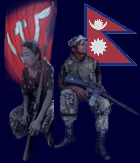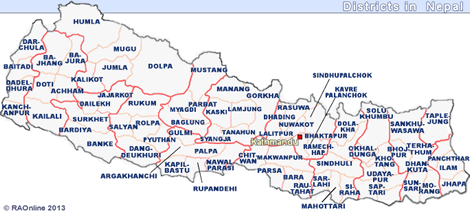| Reports
on Nepal's Civil War |
September
2005
Local
Nepali Congress leader Tilak Bahadur Khatri does not bat an eye when the
ceasefire is mentioned. For him, it's just part of a good strategic game
plan. "When the king can describe himself and parties as husband and wife,
the Maoist ceasefire is neither a surprise nor is it of any good," he declares.
"Anything is possible."
Instead,
Khatri seems preoccupied with what is going to happen next in his little
town of Jaygadh about three hours northeast of Sanphe Bagar. Locals here
say that when the government failed to agree to the ceasefire, local Maoist
cadres felt at risk and left the area's villages to seek refuge in the
far-flung hills. Villagers say they now feel even more unsafe and exposed
because with the rebels gone, security forces are free to fill the vacuum.
"That's
what they usually do, come when Maoists are not around and trouble the
villagers," says shopkeeper Min Raj Timilsina.
 |
Full
story ... |
 |
Nepali Times: Ceasefire
fears
(September
2005) - no link
|
September
2005
| "It
has to be reciprocal" |
"We
met Maoists on the way but they said nothing about a ceasefire," says 27-year-old
Bal Bahadur Rai, who arrived in Chhatara after walking along the Kosi for
two days from Bhojpur district. Rai and his group were herding goats to
the market towns of the tarai. "Ceasefire or no ceasefire, it makes no
difference to us," added Man Bahadur Rai, 65.
Even
after the unilateral ceasefire announced by the Maoists, there seems to
be either a lack of communication or a break down in the chain of command.
Rebel road blockades are intact in the district headquarters of Pachthar
and Taplejung in the east and local Maoist commanders are saying that the
ceasefire statement from their leader was not clear so they have decided
to maintain their blockades. Ratna Tuladhar. Other activists also believe
this is a great opportunity for the government to match the Maoist offer.
 |
Full
story ... |
 |
"It has to be reciprocal"
(September
2005) - no link
|
September
2005
Five
days have passed since the Maoists declared a unilateral ceasefire and
now everyone is asking 'what next'?
Given
the fate of previous ceasefires and how they were used for tactical advantage,
there is also scepticism about the motives behind the Maoist move. Many
pundits believe that the rebels have effectively cornered the king, while
ordinary Nepalis who seek only peace are worried that the government and
army haven't yet reciprocated.
"In
similar conflicts elsewhere, when one side calls for a ceasefire the other
side usually responds positively," says former peace negotiator Padma Ratna
Tuladhar. Other activists also believe this is a great opportunity for
the government to match the Maoist offer.
 |
Full
story ... |
 |
Nepali Times: What
next?
(September
2005) - no link
|
September
2005
The
shift in Maoist strategy that had been emerging since June has now crystallized
in what is evidently a tactical and - for Kathmandu - deeply unsettling
unilateral declaration of ceasefire.
On
September 3, Maoist chief Pushpa Kamal Dahal, aka Prachanda, issued a media
statement declaring a three-month truce under which the Maoists will not
undertake any "offensive activities", but will "remain in a position of
active defense and resist if there is an offensive from the side of "the
enemy" (the government).
The
Maoist chief also warned that if the government intensified its military
offensive or expanded army bases by interpreting the Maoist move as "weakness",
the ceasefire could be ended at any point.
 |
Full
story ... |
 |
Asia Times: War
by other means
(September
2005) - no link
|
September
2005
| Nepal
Maoists are 'open to talk |
Senior
rebel leader Prachanda said a dialogue could take place if the royalist
government reciprocated the offer of a truce.
But
he ruled out the possibility of immediate talks with the government.
The
government has said it doubts the sincerity of the offer, but opposition
parties have welcomed the move.
The
comments by the rebel leader come less than a week after the rebels ruled
out talks with the king and declared a three-month truce, in order to open
a dialogue with the main opposition parties which have been protesting
against the king.
 |
Full
story ... |
 |
Nepal
Maoists are 'open to talks'
(September
2005) - no link
|

|
September
2005
| No
immediate possibility of Govt-Maoist talks |
Padma
Ratna Tuladhar, one of the facilitators of previous two rounds of government-Maoist
peace talks, has said there is no possibility of immediate dialogue between
the government and the insurgents even as the latter declared a three-month-long
unilateral ceasefire today.
Talking
to Nepalnews, Tuladhar said that CPN (Maoist) supremo Prachanda's statement
to observe unilateral ceasefire for the next three months is basically
a confidence building measure rather than a real gesture of talks with
the royal government.
 |
Full
story ... |
 |
No
immediate possibility of govt-Maoist talks
(September
2005) - no link
|

|
September
2005
| Nepal
Maoists seek to isolate king |
The
Maoists do not want the dissolved parliament restored
The
unilateral ceasefire declared by Nepal's Maoist rebels on Saturday is strategically
timed and is intended to isolate King Gyanendra rather than help his government.
It
comes in the wake of important meetings of the country's two largest political
parties, the Nepali Congress and the Nepal Communist Party (United Marxist-Leninist)
(NCP-UML).
After
the meetings, the parties decided to abandon their allegiance to a constitutional
monarchy.
 |
Full
story ... |
 |
Nepal
Maoists seek to isolate king
(September
2005) - external link
|

|
|
Nepal's
Maoists declare ceasefire
|
September
2005
| Maoists
have declared a unilateral three-month ceasefire |
 |
Rebel
leader, Prachanda, said the Maoists would "not launch any offensive" during
the truce, which began on Saturday.
In
the past few months the rebels have been trying to woo political parties
who are also opposed to the rule of King Gyanendra. |
|
The
king assumed direct power in February, saying politicians had failed to
tackle the nine-year insurgency.
In
a statement issued on Saturday, Mr Prachanda said his forces would remain
in a state of what he called "active defence" and would not launch any
fresh offensive unless attacked. He warned, however, that if the army increased
its military activities or expanded its camps, his party would break its
ceasefire and launch what he called an offensive of even higher level.
 |
Full
story ... |
 |
Nepal's
Maoists declare ceasefire
(September
2005) - external link
|

|
|




